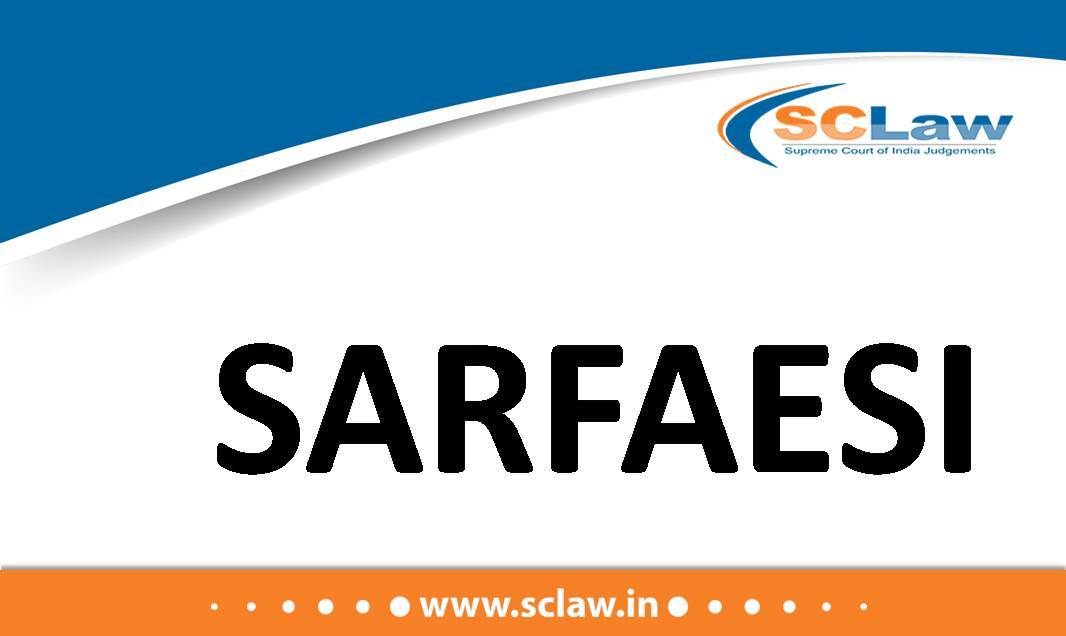Supreme Court grants custody of child to father in transnational guardianship case, asks for mirror order from Nairobi court The Court noted that though its judgment would not be binding on the Nairobi court, it would have “great persuasive value”.
The Supreme Court, in a 2:1 judgment, granted custody of a child to the father after the 11-year-old expressed his desire to live with that latter. The Court has…
Trivial Procedural Lapses Not A Ground To Nullify SARFAESI Proceedings Initiated By Secured Creditor If No Substantial Prejudice Was Caused To Borrower
SUPREME COURT OF INDIA FULL BENCH M/S. L&T HOUSING FINANCE LIMITED — Appellant Vs. M/S. TRISHUL DEVELOPERS AND ANOTHER — Respondent ( Before : L. Nageswara Rao, Hemant Gupta…
NDPS Held Recovery of 3kg 100gms charas – Compliance with Section 50 – Safeguards for search of a person would not extend to his bag or other article being carried by them
SUPREME COURT OF INDIA FULL BENCH RAJESH DHIMAN — Appellant Vs. STATE OF HIMACHAL PRADESH — Respondent ( Before : N.V. Ramana, Surya Kant and Hrishikesh Roy, JJ. )…
HELD total quantity in the instant case is 1 kg 230 gms charas, which exceeds the definition of ‘commercial quantity’ as specified at Sl. No. 23 in Notification S.O. 1055 (E), dated 19.10.2001 – Thus, the sentence accorded by the High Court is clearly already far too charitable
SUPREME COURT OF INDIA FULL BENCH RAVEEN KUMAR — Appellant Vs. STATE OF HIMACHAL PRADESH — Respondent ( Before : N.V. Ramana, Surya Kant and Hrishikesh Roy, JJ. )…
DEFAULT BAIL – the magistrate ought to inform the accused of the availability of the indefeasible right u/S 167(2) CrPC once it accrues, without any delay.HELD Irrespective of the seriousness of the offence and the reliability of the evidence available, filing additional complaints merely to circumvent the application for default bail is an improper strategy.
SUPREME COURT OF INDIA FULL BENCH M. RAVINDRAN — Appellant Vs. THE INTELLIGENCE OFFICER, DIRECTORATE OF REVENUE INTELLIGENCE — Respondent ( Before : Uday Umesh Lalit, Mohan M. Shantanagoudar…
Service Law – Claim to re-employment – continuation in service – HELD the view in Indu Singh, 2017 SCC Online 1527 dealing with an identical statute, was correctly interpreted – Impugned judgment and orders of the High Court are set aside – Appellants consequently, to continue till the end of the following June on re-employment – Appeal allowed.
SUPREME COURT OF INDIA DIVISION BENCH NAVIN CHANDRA DHOUNDIYAL — Appellant Vs. STATE OF UTTARAKHAND AND OTHERS — Respondent ( Before : Uday Umesh Lalit and S. Ravindra Bhat,…
Tender agreement – Termination of – enquiry report prepared by the M D was conducted ex parte & the M D failed to offer opportunity of hearing before passing the order impugned which terminated agreement for no justifiable reason to hold that the respondent was at fault . Bias therefore, cannot be ruled out, terminating the agreement cannot be sustained in law.
SUPREME COURT OF INDIA FULL BENCH STATE OF U.P. — Appellant Vs. SUDHIR KUMAR SINGH AND OTHERS — Respondent ( Before : R.F. Nariman, Navin Sinha and K.M. Joseph,…
IMP : Cancellation of the award of tender in favour of the applicant, the audi alteram partem rule were breached in its entirety. HELD writ petition under Article 226 of the Constitution is maintainable at the instance of an aggrieved party to enforce a contractual obligation of the State or its instrumentality when the State acts in an arbitrary manner.
Cancellation of the award of tender in favour of the applicant, the audi alteram partem rule were breached in its entirety. HELD writ petition under Article 226 of the Constitution…
Supreme Court Of India Cannot Be A Place For The Governments To Walk In When They Choose Ignoring The Period Of Limitation HELD Special Leave Petition filed by the State of Madhya Pradesh with a delay of 663 days, dismissed..
We are also of the view that the aforesaid approach is being adopted in what we have categorized earlier as “certificate cases”. The object appears to be to obtain a…
All Stay Orders On Civil/Criminal Proceedings Passed By Courts, Including HCs, To Automatically Expire Within 6 Months Unless Extended For Good Reasons
“We must remind the Magistrates all over the country that in our pyramidical structure under the Constitution of India, the Supreme Court is at the Apex, and the High Courts,…
















